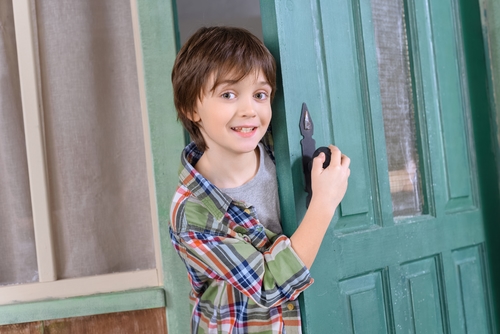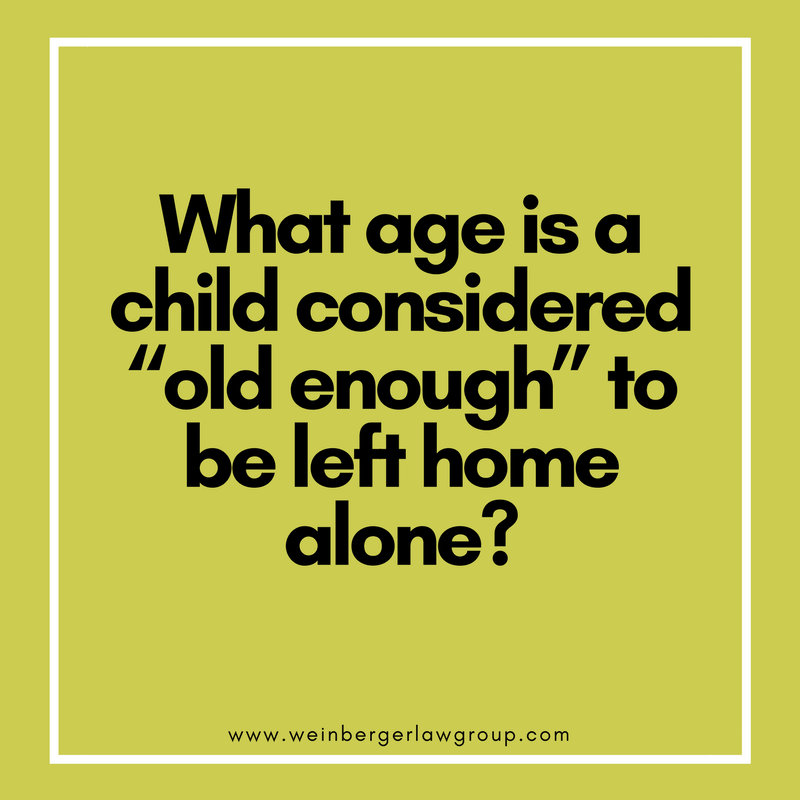Home Alone? When Does Leaving You Kids Become Neglect?

When parents make the decision to leave their children home unsupervised, sometimes, it’s by choice and sometimes it’s by necessity. Perhaps the parent is going next door to a friends for a short time. Or, perhaps they need to get to a job interview and can’t afford child care. When does this decision mean that the parent is neglecting their child?
How old does my child have to be to be left alone?
It actually is a very common question. Parents frequently want to know at what age is a child considered “old enough” to be left home, unsupervised. Can the parent head out for the evening with friends? Can they run down to the drugstore to pick up a prescription? Can they take a four-day vacation without the children?
Many of these parents are facing a hard decision because many of them simply cannot afford child care. Other parents find themselves without the support of their child’s other parent or extended family whom they can call at a moment’s notice to come care for the kids. And, sometimes, it is just not feasible to bring the children along, especially in the case of going to work or going on a job interview.
A lot of times, this question comes up when parents are fighting over custody. Moms or dads, angry that their child was left home alone, immediately rush to judgment and demand custody of the child because of their being left unsupervised. This can lead to long, expensive and angry court battles that drain everyone in the family, including the children.
So, what does the law say in New Jersey?
To many parents’ surprise, there actually is no law on the books here in New Jersey that specifies an age that is deemed appropriate by the State for a child to be left home alone. So, if a parent is looking for a hard and fast age as a guide, they simply will not find one. Why? Because the law in the Garden State recognizes the fact that all children are different. One thirteen-year-old child may be less mature than a ten-year-old. But, there are some guidelines put out by the New Jersey Department of Child Protection & Permanency (formerly DYFS) that should be followed by parents considering leaving their kids unattended at home. And, if you are found to have left your child inadequately supervised, you may be seen as neglecting your child, so take them seriously:
Age of your child: Common sense should tell a parent not to leave a three-year-old child alone at home. Doing so could subject you to DCPP court action for neglect. Strongly consider your child’s age.
The abilities of your child: Again, if your child does not have the simple abilities to use a phone or the faucet, it is probably not advised that you leave them alone.
Your child’s judgment: Do they know not to play with matches? Or climb onto the roof? Again, you know your child. Make decisions based upon their level of judgment.
The general health and developmental level of your child: If your child has severe developmental delays that affect thier ability to provide even the most basic care for themselves, do not leave them unattended.
The reasonableness that the child can care for him/herself for a limited period of time while a parent is out: Can you reasonably say that your child can care for themselves while you are gone? Can he or she make a simple meal or order pizza? Can they bathe themselves if you aren’t there?
The number of children in the home: It’s probably not a good idea to leave 4 or 5 younger children alone in a home or even in the care of an older sibling. There is obviously more risk of something going wrong if there is a large number of children left alone.
When the parent is expected to return: Are you running to the local grocery store to pick up milk or are you flying to Europe for a two-week vacation? Again, use your best judgment to determine if you children can fend for themselves appropriately for any extended period of time.
How often the child is left alone: You child may be used to being left alone, perhaps as a “latch-key” kid that is able to care for him or herself after school until you get home from work. If your child is a seasoned vet at being left home alone, you will obviously have an easier time leaving them unsupervised.
Whether the child knows how and where to contact the parent, and/or to call a neighbor, adult friend or local police, if necessary: Does your child know how to use the phone? Do they have a cellphone? Do they know your number or the number of a trusted neighbor? Can they get to a relative’s house who lives in the neighborhood, if necessary? Have you instructed them to call 911 in an emergency?
Whether there is a home telephone in working order: With the increase of cell phones here in the US, many people do not have a landline in their home any longer. If you do, make sure that it is operating. If you do not, make sure that you leave a child with their own cellphone or a cellphone that they know how to operate in case they need to reach you or the police.
DCPP is involved. Why?
Perhaps your child’s other parent became concerned that your child was left alone and was in fear that they were in danger and reported this to DCPP. Again, if leaving your child unattended is viewed by DCPP as neglectful, you may be facing a court hearing. According to the law here in New Jersey a parent can be seen as neglecting a child if they do not provide a “minimum degree of care.” Now, this does not mean simple carelessness; leaving your child home alone must rise to the level of gross negligence, which is an extremely high degree.
Of course, if you find yourself in court, get a good attorney. Know that any determination whether or not you neglected your child is up to the judge. Judges look at the facts of each case and consider whether or not “an ordinary reasonable person” would understand that a particular situation is “perilous” to a child according to the law.
And, while judges must be reasonable, themselves, it is always important to remember that all judges are not the same. That is why it is so important to have the guidance of a strong family law attorney experienced in DCPP cases so that you know your rights, responsibilities and options.
In the end, you are your child’s caretaker, advocate and parent. You know your child better than anyone and you have the right to parent as you see fit. Take the time to think about all that goes into the decision to leave your child at home. If you strongly believe that your child is confident, capable and secure enough to handle your absence, you are probably right.
If you have any further questions about parenting time, DCPP, child welfare investigations, or any other area of family law, contact our office today to schedule a confidential consultation with one of our compassionate family law attorneys who is experienced in handling these types of matters. And, for more reading on this topic, take a look at our blog on Free Range vs. Helicopter Parenting.
Read More:
Asbury Park Press: Does New Jersey Need A Home Alone Law? (Featuring Bari Weinberger)




